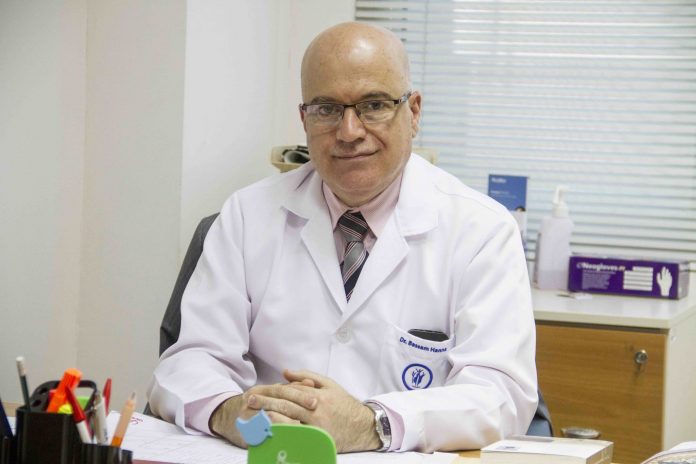With the advent of modern age, man has somewhere forgotten his roots and has changed his lifestyle to meet up the trends set by cultures that were once alien to them. Along comes with it the list of ailments that has been going down generations. Dr. Bassam Hana, consultant in Endocrinology, Diabetes and metabolic disorders at the Gulf Diabetes Specialist Center spoke to BTW, sharing with us the importance of the proverb ‘prevention is better than cure’ in today’s world.
Visiting your Endocrinologist
Many a time we as patients fail to understand whether or not to take the advice of an endocrinologist. Weighing on the symptoms that certain diseases have on us, the practitioners whom we might choose refers to the concerned specialist and sometimes lives change forever in a single visit. As Dr. Bassam says, “It is common that patients walk into my consultation room when they have symptoms of diabetes and thyroid”. “Cardiologists refer their patients when there are cases like palpitation of the heart associated with my specialization. Symptoms of low growth rate in kids with age, premature puberty in both female and male, Osteoporosis, hyperlipidemia, hypercholesterolemia, infertility in men and women and all the other ailments related to hormone needs to the advice of an expert endocrinologist.”
Pituitary Cancer.
Pituitary gland is one of the important glands of human body located at the base of the brain and controls activities of the body including stimulating the growth. “Disease of this gland is the condition what we term as hypertrophy or tumor enlargement. Fortunately it is benign and can be treated. There are many facilities for diagnosis available today and treatments have become easy with oral medicines injections or surgery.”
“Even in such surgeries these days, we don’t open the skull but access the tumor through nose and remove it safely” Dr. Bassam stated.
Hereditary, lifestyle and diabetes
Dr. Bassam explains “Our body is adapted to sustain the extreme living conditions of this region of the world. It means that the body would require less calorie intake and would require more physical activities. This is there in our genes. But for the last 30 years and more the living habits have changes and people are driven by western eating habits combined with lethargic lifestyles. It is not wrong to say that we are overfed and have become obese. The dangerous combination of our genes and modern lifestyle definitely ends us in disease such as diabetes. ”
“And for those who have smoking as part of their lifestyle, will have 9 times more chance of having complications associated with diabetes as both affects the arteries. When neglected without a controlled living, diabetes can even lead to the worse of them all – amputations.”
Pediatric Diabetes
With the children these days becoming couch potatoes, there is an increasing alarm of diabetes starting at a very young age. Dr Bassam clarified, “It was the type 1 diabetes which was mostly found in the past. It involved the destruction of beta cells of pancreas and insulin was the only solution. Now there is more of type 2 which is due to hereditary and obesity. And the treatment involves diet, exercise and giving insulin comes only at the last stage.”
“Diabetes as you would know, you have to live with it. But with the new treatments available, you can avoid the complications associated like the ones that would affect your eyes, heart or kidney. Insulin injections are now easy to use. Even kids can take it themselves with proper training. Diabetes is easy to manage when you have support of the family. It is never the end of world.”
Osteoporosis
“Women are more susceptible to osteoporosis than men.” said Dr Bassam. “After 40-50 years of age there is an increased decline of sexual hormones in females than in males. The lowering of female hormones acts on the bones and osteoporosis occurs. Along with that there are factors of hereditary and inactivity also involved.” He continued. “Osteoporosis being a silent disease will not show any symptoms and the only way to diagnose it is to undergo a screening test. It is always advised for women after 40-50 years of age to undergo a bone density test to identify the condition at the early stages and have the treatment begun.”
Talking about prevention he said, “Sufficient amount of calcium including supplements should be added into daily diet. Along with it a daily dosage of 1000 units of Vitamin D can prevent osteoporosis.” ”As you would know sun is the natural source of Vitamin D. So my advice would be to go out with the family to a good park or garden and enjoy your time. If you are exercising in the sun half an hour should be enough. And the best time to get the goodness of natural Vitamin D would be the morning hours.”
Memories being an Endocrinologist
“Some of the good memories come with seeing patients who had problems with fertility undergoing treatment successfully and having their baby. The happiness of a woman getting to be a mother is priceless and dealing with them gives the satisfaction. I feel sad every time when I get to see a child or an adult with neglected diabetes ending up with the associated complications and destroying them. These are the times when we won’t be able to help even if we want to. I have also seen people who have been living 25-30 years with controlled diabetes and I am glad seeing such well treated individuals who value their life.”

